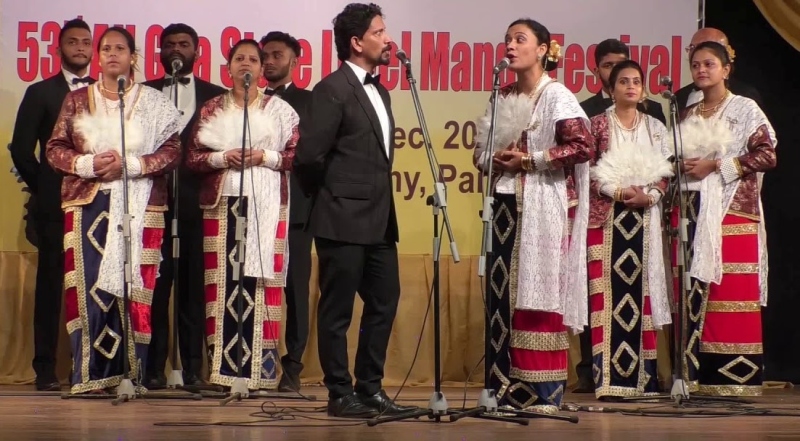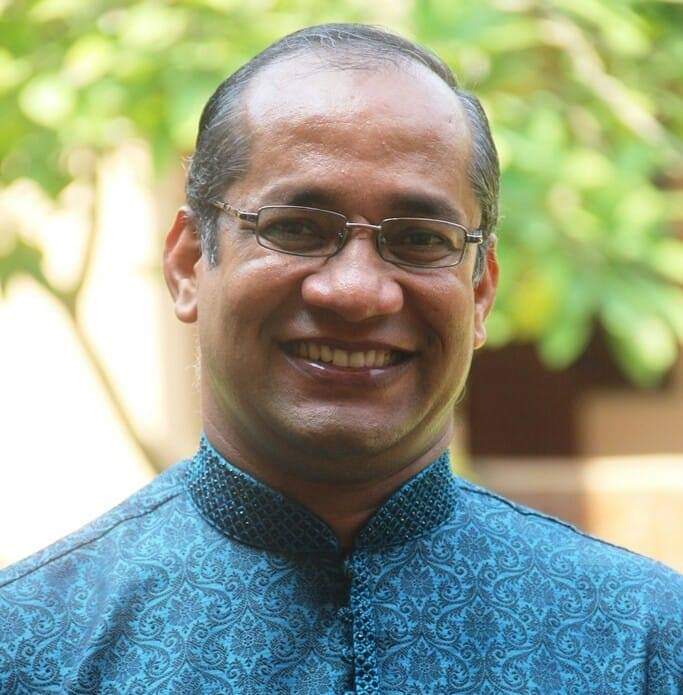
Goa is a cradle and the storehouse of western music in India. While the parochial schools have greatly contributed to the nurturing of this western music in Goa, the role of the temple schools, before the arrival of the Portuguese cannot be ignored.
In th e sixteenth century, the Portuguese on arrival and subsequent conversion plans saw that the temple corridors had schools attached to them where boys were being taught Hindu sacred scriptures and Hindustani Music. Seeing the impact it produced, the Portuguese borrowed this model and gave rise to the parochial schools in 1545, where boys were being taught the catechism, the 3R’s and the rudiments of western music. This encounter of the Hindustani music with the newly learnt western music gave rise to an altogether a new and third type of music, neither Indian nor western, but uniquely “Goan”. The Mando-Dulpod being a perfect example of it.
e sixteenth century, the Portuguese on arrival and subsequent conversion plans saw that the temple corridors had schools attached to them where boys were being taught Hindu sacred scriptures and Hindustani Music. Seeing the impact it produced, the Portuguese borrowed this model and gave rise to the parochial schools in 1545, where boys were being taught the catechism, the 3R’s and the rudiments of western music. This encounter of the Hindustani music with the newly learnt western music gave rise to an altogether a new and third type of music, neither Indian nor western, but uniquely “Goan”. The Mando-Dulpod being a perfect example of it.
The exact origin of Mando is unknown since it was passed through oral traditions. However, some written sources attest its origin to the first quarter of the 19th Century, prominently in the Salcette villages of Raia, Loutolim and Curtorim because these were the villages of origin of the first identified composers.
The Goan Mando comprises poetry/lyrics, music, and dance. As a poetry/lyric, Mando has a well-defined structure comprising of 4-lines stanzas and 2-lines refrain (estrebilho). As music, Mando embraces a healthy blend of western and eastern musical traditions, best symbolized by Violin and Gumat, the two traditional musical instruments that accompany the Mando performance. It is sung as a duet by two soloists, male, and female, singing in harmony (primeiro/segundo) and the refrain (estrebilho) being sung in multipart voices by a chorus. When danced, it is performed by males and females in pairs, facing each other, gracefully gliding forward and backwards.
The traditional Mando focused on the theme of romantic love. Its lyrics expressed the sweet-bitter nature of love—the bliss of happy marriage and the sadness of infidelity, the ecstasy of love and the cruelty of betrayal. Some Mandde also had social, biographical, and even political themes. Interestingly, although the Portuguese had a profound influence on Goa’s elite class, who had adopted their language for writing as well as speaking, yet, when it came to expressing the inner-most sentiments of their hearts, through a love song, Mando, they chose the vernacular, Konkani.
Mando can be an independent song and can also be followed by Dulpods as a sequence. Although the rhythm of the Dulpod takes the same measure as the Mando, yet it is faster, more animated, and exciting. Mando is usually melancholic while the Dulpods are full of wit, satire, humour. While a Mando is generally constructed around the theme of love, the Dulpods take into its composition anything that comprises issues of the Goan daily life, mainly rural, giving a quick and interesting glimpse of the Goan life. It also includes political and social satires.
With the advancement in music technologies, such as recorded music, Mando, which was often sung at weddings and other festivities, began to be replaced by these, and Mando remained exclusively performed by a few families at their private celebrations. Under this context, the efforts of the Goa Social and Cultural Centre in organizing this state-level Mando festival for over five decades played a significant role in preserving this musical tradition. Other folkloric organizations such as Gavana also contributed immensely to this endeavour.
This festival is of great significance in Goa’s annals of history.
After Goa’s liberation from the colonial status (1961), the language became an important issue in deciding the status of Goa, since Indian states were demarcated based on the linguistic identity. At that time, Konkani was not recognized as a language of Goa as it was almost forbidden by the Portuguese during its colonial rule. Goa needed a language of its own to save it from being merged with Maharashtra, a decision that would be made through the historic Opinion Poll of 1967. Under such a context, two years before this poll, some concerned Goans, under the leadership of Bernardo Fernandes, (1909 -1994) the then President of the Clube Nacional, organized the first-ever Mando festival in August 1965. By this, Goa presented to the Indian authorities that she has its language, hidden in its musical repository.
Mando, originally sung and danced at the mansions of the rural elite gentry, through this festival transformed from an in-house private drawing-room activity to a vibrant open-air public stage performance. In addition, this festival also transformed the Mando practice from being sung by a few sections of Goan society to being sung by all the people of Goa, irrespective of their social, cultural, and economic backgrounds so vividly seen at every annual Mando festival. Above all, this festival saved the Mando tradition from being an antique or a museum piece.
This year, considering the present scenario of the Covid and given reaching out to a wider audience over the world, for the first time, the organizers of the Mando festival, The Goa Cultural and Social Centre (GCSC) will live stream its 54th Mando Festival on December 9 and 10, on Youtube and Facebook from 7 pm onwards.
Mando, a poetic expression infused with emotions of love; encompassing an artistic blend of eastern and western musical traditions is ready to sway you. Are you ready for this annual festivity that has done so much to preserve this unique musical tradition of Goa?
(The writer is currently pursuing his PhD on the Mando festival -- a case study-- whilst residing at the Xavier Centre of Historical Research, Porvorim)